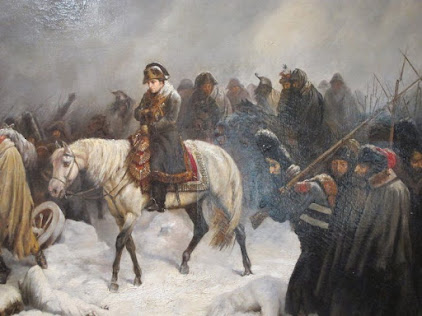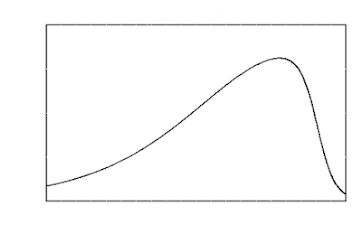An evident trend that we observe in history is that, in times of crisis, strong leaders tend to take over and assume all powers. It has happened with the Romans, whose government system moved from democracy to a military dictatorship. It seems to be happening to us, too, with more and more power being concentrated in the hands of the man (rarely the woman) at the top of the government's hierarchy.
There are reasons for this trend. Human society, as it is nowadays, doesn't seem to show any sign of collective intelligence. It is not a "brain," it can't plan for the future, it just stumbles onward. So, in a certain way, it makes sense to put a real brain in charge. The human brain is the most complex thing we know in the whole universe and it is not unreasonable to hope that it could manage society better than a mob. The problem is that, sometimes, the brain at the top is not so good, actually it may be horribly bad. Like in the movie "Young Frankenstein," even with the best of goodwill, we may put abnormal brains inside society's head. Dictators, emperors, warlords, big men, generalissimos, strongmen, tycoons, and the like often indulge in killing, torturing, and oppressing their subjects, as well as in engaging in unprovoked and ruinous wars. On top of all that, they are also often sexual perverts. The final result is that they look like the prototypical evil madman character of comics or movies, complete with bloody eyes, wicked smile, and Satanic laughing.
The problem is that, sometimes, the brain at the top is not so good, actually it may be horribly bad. Like in the movie "Young Frankenstein," even with the best of goodwill, we may put abnormal brains inside society's head. Dictators, emperors, warlords, big men, generalissimos, strongmen, tycoons, and the like often indulge in killing, torturing, and oppressing their subjects, as well as in engaging in unprovoked and ruinous wars. On top of all that, they are also often sexual perverts. The final result is that they look like the prototypical evil madman character of comics or movies, complete with bloody eyes, wicked smile, and Satanic laughing.
But simply defining leaders as "mad" or "evil" doesn't tell us what makes their minds tick. Could some of them be truly insane? Maybe brain-damaged? Or is it just a kind of personality that propels them to the position they occupy? These are very difficult questions because it is impossible to diagnose mental illness from one person's public behavior and public statements. Doing that is, correctly, even considered unethical for professionals (even though it is done all the time in the political debate).
Here, I am not claiming to be saying anything definitive on this subject, but I think we can learn a lot if we examine the well-known case of Benito Mussolini, the Italian "Duce" from 1922 to 1943, as an example of a behavior that can be seen as insane and, also, rather typical for dictators and absolute rulers.
The mistakes that Benito Mussolini made during the last stages of his career as the prime minister of Italy were truly colossal, including declaring war on the United States in 1941. Let me give you a less well-known but highly significant example. In October 1940, the Italian army attacked Greece from Albania, a story that I discussed in a previous post. That implied having to cross the Epirus mountains in winter and how in the world could anyone think that it was a good idea? Why not wait for spring, instead? Unsurprisingly, the result was a military disaster with the Italian troops suffering heavy losses while stuck in the mud and the snow of the Epirus mountains during the 1940-41 winter, until the Germans came to the rescue - sensibly- in the following Spring. In a certain sense, the campaign was successful for the Axis because, eventually, Greece had to surrender. But it was also a tremendous waste of military resources that could have been used by Italy for the war effort against the British in North Africa. The blunder in Greece may have been a major factor in the Italian defeat in WWII.
The interesting point about this campaign is that we have the minutes of the government reunions that led to the ill-fated decision of attacking Greece. These documents don't seem to be available online, but they are reported by Mario Cervi in his 1969 book "Storia della Guerra di Grecia" (translated into English as "The Hollow Legions"). It is clear from the minutes that it was Mussolini, and Mussolini alone, who pushed for starting the attack at the beginning of Winter. During a reunion held on Oct 15, 1940, the Duce is reported to have said the date for the attack on Greece had been set by him and that "it cannot be postponed, not even of one hour." No reason was given for having chosen this specific date and none of the generals and high-level officers present at the reunion dared to object and to say that it would have been better to wait for spring to come. The impression is that Italy was led by a bumbling idiot surrounded by yes-men, and the results were consistent with this impression.
What made Mussolini behave in this way? There is the possibility that his brain was not functioning well. We know that Mussolini suffered from syphilis and that it is an illness that can lead to brain damage. But a biopsy was performed on a fragment of his brain after his death, in 1945, and the results were reasonably clear: no trace of brain damage. It was the functional brain of a 62-year-old man, as Mussolini was at the time of his death.
Mussolini is one of the very few cases of high-level political leaders for whom we have hard evidence of the presence or absence of brain damage. The quintessential evil dictator, Adolf Hitler, is said to have been suffering from Parkinson's or other neurological problems, but that cannot be proven since his body was burned to ashes after his suicide, in 1945. After the surrender of Germany, several Nazi leaders were examined in search of neurological problems. For one of them, Robert Ley, a post-mortem examination revealed a certain degree of physical damage to the frontal lobes. Whether that was the cause of his cruel behavior, however, is debatable.
That's more or less what we have. It doesn't prove that evil leaders never suffer from brain damage but the case of Mussolini tells us that dictators are not necessarily insane. Rather, they are best described as persons who suffer from a "narcissistic personality disorder" (NPD). It is a syndrome that describes their vindictive, paranoid, and cruel behavior, but also their ability to find followers and become popular. So, it may be that the NPD is not really a "disorder" but, rather, something functional for becoming a leader.
There lies the problem: even in a democracy, a politician's first priority is being elected and that's a very different skill than that needed for leading a country. An NPD-affected ruler may not be necessarily evil, but he (very rarely she) will be almost certainly incompetent. It happens not just in politics, but also in business. I could also cite the names of scientists who seem to be affected by NPD. They are often incompetents in their fields, but they may achieve a certain degree of success by means of their social skills that allow them to accumulate research grants and attract smart collaborators. (Fortunately, they can't jail and torture their opponents! Not normally, at least.)
The problem with this situation is that, everywhere in the world, NPD-affected individuals aim at obtaining high-level government positions and often they succeed. Then, ruling a whole country gives them plenty of chances to be not just incompetents, but the kind of person that we describe as "criminally incompetent." The kind of disaster that can result may be illustrated, again, by Mussolini's case. During the Greek campaign, the Duce ordered the Italian Air Force to "destroy all Greek cities with more than 10,000 inhabitants" as reported by Cervi and by Davide Conti in his "L'occupazione italiana dei Balcani" (2008). Fortunately, the Italian air force of the time was not able to carry out this order. But what would happen if a similar order were given today by a leader who can control atomic weapons?





